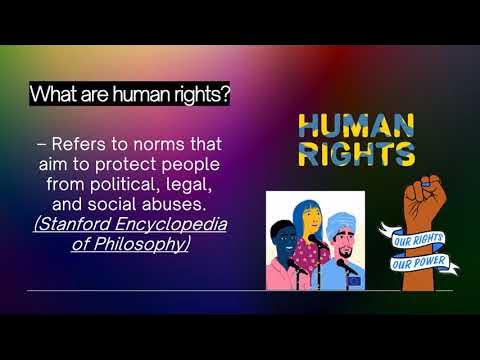Special Procedures of the UN Human Rights Council
Summary
TLDRThe video highlights the vital role of special procedures within the Human Rights Council as independent experts who monitor human rights violations worldwide. They serve as early warning systems, providing guidance and raising awareness of emerging issues. Through direct engagement with affected communities and various stakeholders, these experts advocate for change and recommend protective legislation. Emphasizing empathy, expertise, and a commitment to improving lives, the special procedures aim to transform reports into actionable solutions, reminding the international community of its responsibility to uphold human rights for all.
Takeaways
- 👁️ Special procedures act as the 'eyes and ears' of the UN Human Rights Council, monitoring and assessing human rights situations globally.
- 🚨 They provide early warnings about potential human rights violations, allowing for timely intervention and advocacy.
- 📜 Independent experts under special procedures have the authority to report on specific human rights issues and engage with various stakeholders.
- 🤝 Dialogue with states and non-state actors is crucial for understanding and addressing human rights concerns.
- 📝 Special procedures produce thematic reports, opinions, and recommendations that inform the international community about human rights issues.
- 🌍 They conduct country visits to engage directly with affected individuals and communities, enhancing their understanding of local contexts.
- 📬 A lesser-known complaints mechanism allows individuals to report human rights abuses and seek assistance from independent experts.
- 🏛️ Special procedures play a significant role in promoting protective legislation and influencing national legal frameworks for human rights.
- 💬 Empathy and effective communication are essential traits for independent experts to build trust and represent victims' voices.
- 🌟 The commitment to human rights work is often driven by personal dedication, and experts strive to make a tangible difference in the lives of individuals and communities.
Q & A
What are the special procedures of the Human Rights Council?
-The special procedures are independent experts appointed by the Human Rights Council to monitor and report on specific human rights issues, provide advice, and engage in dialogue with states and non-state actors.
How do special procedures contribute to the prevention of human rights violations?
-They act as an early warning system, identifying potential human rights violations and bringing attention to new thematic issues, allowing the Council to take timely action.
What role do independent experts play in assessing human rights situations?
-Independent experts verify on-the-ground situations, provide guidance on human rights performance, and translate findings into agendas for political action regarding human rights.
How do special procedures interact with states?
-They engage in extensive dialogue with governments and civil society, advocate for human rights, and provide recommendations to improve human rights practices.
What mechanisms do special procedures have for addressing human rights abuses?
-They have a complaints mechanism that allows individuals or communities affected by human rights violations to communicate directly with independent experts and seek assistance.
What is the significance of country visits conducted by special rapporteurs?
-Country visits allow experts to engage directly with various stakeholders, including government officials, civil society, and affected communities, facilitating comprehensive assessments of human rights situations.
What types of reports do special procedures produce?
-They produce thematic reports, opinions on arbitrary detention, confidential communications, and urgent appeals, all aimed at addressing specific human rights concerns.
Why is empathy important for independent experts?
-Empathy enables experts to better understand the experiences of victims of human rights violations, fostering trust and effective communication during their advocacy efforts.
What motivates individuals to dedicate themselves to the work of special procedures?
-Many individuals are driven by a personal commitment to human rights and the desire to make a meaningful difference in the lives of vulnerable populations.
How do special procedures impact national legislation regarding human rights?
-By raising awareness and advocating for specific issues, special procedures contribute to the development of national legal frameworks that protect the rights of individuals and communities.
Outlines

This section is available to paid users only. Please upgrade to access this part.
Upgrade NowMindmap

This section is available to paid users only. Please upgrade to access this part.
Upgrade NowKeywords

This section is available to paid users only. Please upgrade to access this part.
Upgrade NowHighlights

This section is available to paid users only. Please upgrade to access this part.
Upgrade NowTranscripts

This section is available to paid users only. Please upgrade to access this part.
Upgrade Now5.0 / 5 (0 votes)





